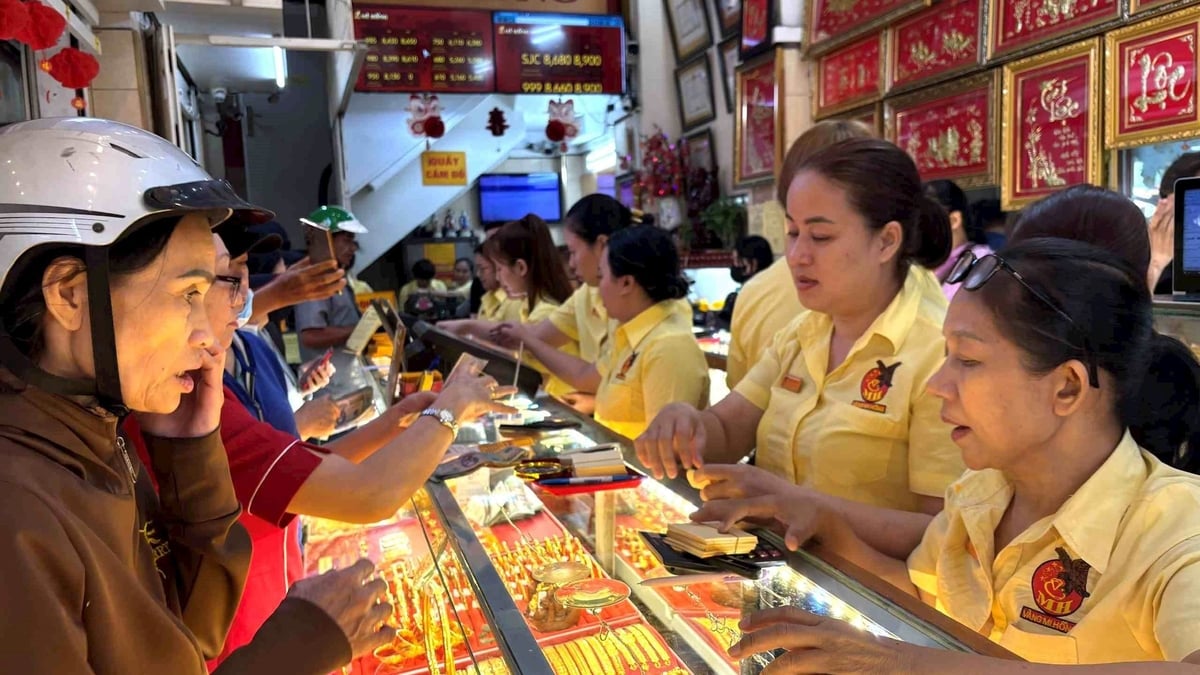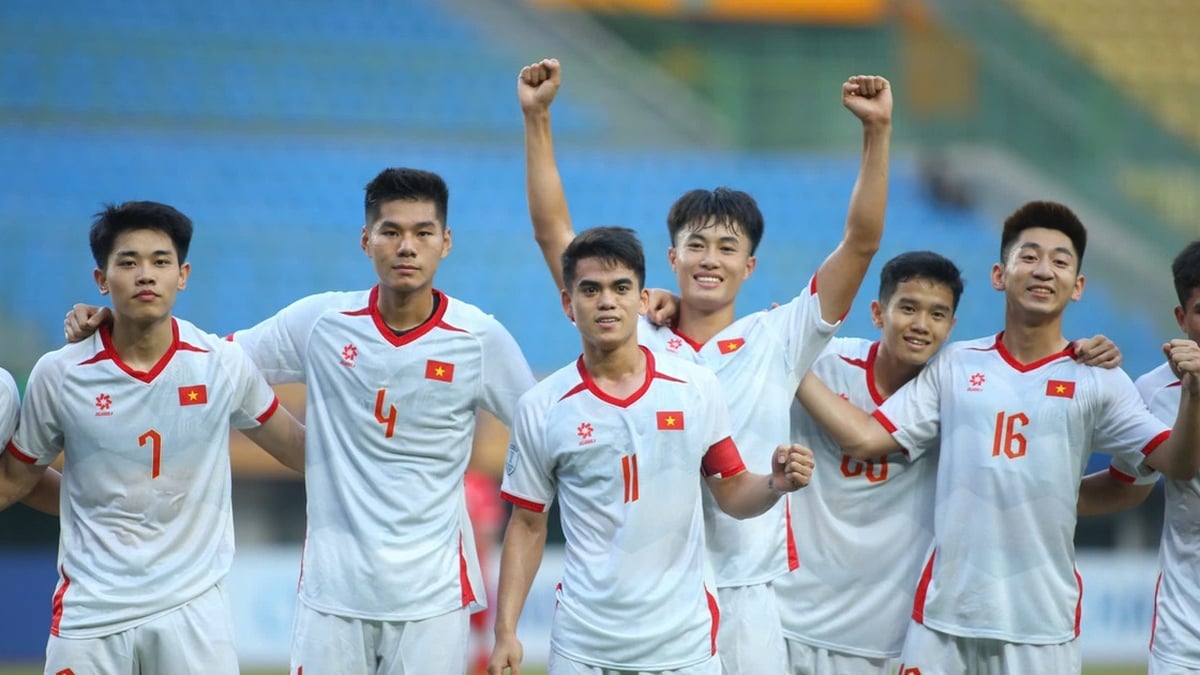Practice has confirmed that the correct leadership of the Party is the leading factor determining all victories of the Vietnamese revolution. This is also clear evidence that the nature of a democracy does not depend on a multi-party or single-party regime, and for Vietnam under the sole leadership of the Communist Party of Vietnam , democracy is not only not lost, not limited, but also guaranteed and widely promoted in reality.

The same old “tricks”: In the name of innovation and democracy, domestic and international reactionary forces are trying to promote and call for political pluralism and multi-party opposition. They seem to sincerely “advise” us that if we do not want to follow the “footsteps” of the Soviet Union, we need to follow the Western model. However, both in theory and in practice, it has been shown that these are just empty and fallacious arguments of those who oppose our Party and State.
Fully identifying and fighting to refute, convince, and clearly expose the false, anti-revolutionary, and anti -scientific points in the argument that "pluralism and multi-party system are synonymous with democracy" is extremely important in the current ideological struggle and protection of the Party's ideological foundation.
Vietnam does not need political pluralism.
The historical reality of the Vietnamese revolution shows that the leadership of the Communist Party of Vietnam over the country is an inevitable choice of history, the will of the entire people. The birth of the Communist Party of Vietnam followed both general laws and the specific historical laws of Vietnam, resolving the crisis of the national liberation path in the late 19th and early 20th centuries.
During the period from 1930 to 1945, Vietnamese history proves that only the Communist Party, not any other political organization or party, led the Vietnamese revolution. The victory of the August 1945 General Uprising, which led to the birth of the Democratic Republic of Vietnam, was due to the wise and talented leadership of the Communist Party of Vietnam.
By 1946, due to the political situation at that time, in Vietnam, in addition to the Communist Party, two other parties appeared: the Vietnam Nationalist Party and the Vietnam Revolutionary Alliance.
However, in essence, the leadership of the Vietnamese revolution was still only the Communist Party, while the two parties Viet Quoc and Viet Cach, “following Chiang Kai-shek’s lead”, did not stand for the national interest. When Chiang’s army withdrew from Vietnam, these two parties also left with Chiang’s army, leaving only the Communist Party of Vietnam as leader on the political stage. The emergence and withdrawal of the two parties Viet Cach and Viet Quoc showed that: Only the Communist Party was chosen by the people and history of Vietnam, while the parties that did not stand for the people were eliminated by history.

In the later period, besides the Communist Party of Vietnam, there were also two other parties, the Vietnam Democratic Party and the Vietnam Socialist Party. However, both parties acknowledged the leadership role of the Communist Party and later declared their own dissolution because they had completed their historical mission. Indeed, Vietnam once had a multi-party system, but history and the Vietnamese people themselves have denied that system.
Continuing to carry out the noble mission assigned by history, the Communist Party of Vietnam led the people to defeat all plots and invasion plans of the French colonialists, culminating in the historic Dien Bien Phu Victory, forcing them to sign the Geneva Agreement (1954), ending the war of aggression against Vietnam.
The Party led the people to build socialism in the North, fought to liberate the South, defeated the American imperialists' war of aggression, culminating in the historic Ho Chi Minh Campaign, reunifying the country on April 30, 1975. The Party initiated and led the renovation process (from 1986 to present) and achieved great and historic achievements. Since its founding, the Communist Party of Vietnam has always been the vanguard, representing the will, aspirations, and loyalty to the interests of the working people and the entire Vietnamese nation. This is the choice of history.
Reality has affirmed: In Vietnam, there is no other political force, except the Communist Party of Vietnam, that has enough courage, intelligence, experience, prestige and ability to lead the country to overcome all difficulties and challenges, bringing the revolutionary cause of our nation from one victory to another.
Democracy does not depend on the number of political parties.
Practice has proven that democracy or not democracy does not depend at all on the number of parties in a country, on whether or not to apply political pluralism or multi-party opposition, but all depends on the political regime, operating mechanism, level, capacity, and mettle of the ruling party, and the level of education and democracy of society.
Typically, Armenia has about 40 parties, the Netherlands has 25 parties, Norway has 23 parties... but clearly we cannot conclude that Armenia is more democratic than the Netherlands or Norway. In the world today, there are more than 30 countries and territories with a one-party system. That shows that the political system ruled by a single party is not a characteristic only of socialist countries led by the Communist Party and that countries with a one-party system do not ensure democracy and the country does not develop.
Even in capitalism, there are periods when some countries and territories under a single-party regime still ensure democracy and develop strongly. Typically, in the late 1980s, Singapore, South Korea... still followed a single-party regime but the country still developed strongly and conversely, in some multi-party countries, democracy was not implemented well.

The roads in village 2, Tong Lanh commune, Thuan Chau district are paved with clean concrete.
At the same time, in a multi-party political system, at a certain political stage there is only one party that is actually in power and even in the case of a coalition of ruling parties to form a government, the party that holds more seats in parliament will have the right to decide on the country's development policies.
In some other countries (typically the US), although there are many parties, there are only two parties that take turns in power: the Republican Party and the Democratic Party. These parties represent the bourgeoisie and must necessarily aim to serve the interests of the bourgeoisie and cannot be a "government for all people".
Looking at the world, we will see many countries with multi-party systems but extremely limited democracy, endless civil wars, and increasingly impoverished people's lives. Meanwhile, the Vietnamese people, under the leadership of the Communist Party of Vietnam - the only ruling party, have lived freely in peace and have one of the most stable political systems in the world.
Under the leadership of the Party, the revolutionary cause in our country has brought the people the most basic and important rights. That is the right to equality among ethnic groups in the community of 54 ethnic groups, among economic sectors; the right to freedom to legally enrich oneself, to promote democracy associated with maintaining social discipline; the development in the diversity of national cultural identities; the progress in education, culture, society, science and technology, aiming for the progress and comprehensive development of human beings... Why is that? Because the Communist Party of Vietnam, the ruling Party in Vietnam, as Ho Chi Minh affirmed and advised: "Apart from the interests of the nation, of the Fatherland, the Party has no other interests".

People of Nghe Ven village, Muong Va commune, Sop Cop district, pour concrete on the village road.
We also do not deny that violations of democracy or democracy in form still occur in many places. However, that situation does not originate from the nature of socialist democracy, from the one-party regime, but first of all from the degradation of political ideology and morality of a number of cadres, party members, and civil servants, and from loopholes and lack of uniformity in mechanisms and policies, along with limitations in the Party's leadership methods. Those shortcomings go against the nature of the socialist regime, contrary to the nature of the Party.
However, our Party does not hide this reality but frankly admits it in its documents and resolutions, before the people, and is determined to overcome it at all costs. A series of specialized resolutions and drastic actions on Party building and rectification in recent terms have demonstrated that.
A single ruling party still ensures and promotes democracy in society.
The number of political parties, which many people often use as a criterion to determine whether a society is politically pluralistic and democratic or not, does not affect the democracy of a society. Vietnam is currently implementing a socialist-oriented market mechanism, integrating more deeply and fully into the globalization process. With that situation, in Vietnam there are many different economic sectors, respecting the rights and obligations of citizens, respecting human rights, respecting freedom of belief and religion,... All of these have been recorded in the Constitution and institutionalized in laws.
In Vietnamese society, there have been many different opinions, with rich thoughts, but they all have the same force vector for development; some have gone astray from the force vector, but this does not reflect the nature of the political regime. If we understand political pluralism as meaning that in society there must be many opposing political opinions and with opposing tendencies, then political pluralism is not necessarily in that sense.
In Vietnam today, there is no political pluralism and no opposition parties, but Vietnamese society is a diverse society of ideologies, opinions, and even different opinions. Vietnam accepts different opinions, as long as those opinions and actions are with pure motives, with a good heart, not contrary to the constitution and laws, not contrary to the good customs of Vietnamese society and of each community. Democracy is closely linked to state institutions and the rights of the people. President Ho Chi Minh put forward the most suitable viewpoint for Vietnam: Democracy means that the people are the masters and the people are the masters.
A single party in a society that is the ruling party like the Communist Party of Vietnam today will be the leading party to ensure and promote democracy for the whole society. Of course, to do this, the quality of the ruling party is needed.

In reality, in today's world, there are some countries that have many political parties, but they are not truly democratic, and sometimes they even fight for power, causing social disorder and political instability, which in turn slows down the pace of national development. There are also countries and peoples that have many parties, but in reality and in essence, they are just like having one party, because although these parties are different in name and their platforms seem different, their essence is the same because they protect the interests of the same class, the same community, sometimes only differing in the way they operate.
Democracy in Vietnam - Socialist Democracy
After more than 35 years of implementing the renovation process initiated and led by our Party, we have achieved great achievements of historical significance, developing more strongly and comprehensively than in the years before the renovation. The country's position and strength have continuously increased. The economy has begun to develop and has grown continuously at a relatively high rate over the past 35 years with an average growth rate of about 7% per year. The GDP scale has been constantly expanding, reaching 342.7 billion USD in 2020, becoming the fourth largest economy in ASEAN. Per capita income has increased about 17 times, to 3,512 USD; Vietnam has left the group of low-income countries since 2008.

People of Chieng Co commune, Son La city harvest coffee.
Culture and society are increasingly developing, poverty reduction has achieved important results, the poverty rate has decreased, only about 3% in 2020 (according to the multidimensional poverty standard); the country's appearance and people's lives have changed a lot. Politics and society are stable; national defense and security are strengthened. Socialist democracy is promoted and increasingly expanded. Great national unity is consolidated and strengthened.
The work of building the Party, the rule of law state and the entire political system has been promoted. Foreign relations have been expanded and increasingly deepened. In June 2019, with a record number of 192/193 votes, Vietnam officially became a non-permanent member of the United Nations Security Council. On January 1, 2020, Vietnam simultaneously assumed the dual responsibilities of ASEAN Chair 2020 and non-permanent member of the United Nations Security Council for the 2020-2021 term. These two important positions bring regional and international responsibilities, demonstrating the trust and great expectations of international friends in Vietnam.

Medical staff inject Covid-19 vaccine for people in Kim Bon commune, Phu Yen district.
In particular, the ongoing fight against the Covid-19 pandemic is perhaps a testament to the Government’s commitment to a state “of the people, by the people, for the people”. It has also convincingly demonstrated the humane and superior nature of the socialist regime that the Party and the people have chosen.
Although Vietnam is still poor and has limited resources, in the fight against the Covid-19 pandemic, the Government has declared: "No one is left behind" and is ready to "accept sacrifices and economic losses to protect the people". Many experts, scholars and foreigners living in Vietnam have highly appreciated Vietnam's Covid-19 pandemic prevention strategy, considering it a reference model for other countries. Among them are conclusions about what can be learned from Vietnam: Covid-19 is an unprecedented test of state capacity globally, especially for countries that are able to protect the happiness of their citizens. One of the key factors that determines a country's ability to minimize the outbreak of a pandemic is through the widespread mobilization of different components of society to deal with the crisis. It is about the extent to which the state can coordinate effectively... How proud and glorious is the word Vietnam.
Looking back at the country's achievements throughout history under the leadership of the Party, we can affirm that, equipped with Marxism-Leninism and Ho Chi Minh Thought, supported and believed by all classes of people, the Communist Party of Vietnam has not only won in the struggle to gain and maintain power, in the war of liberation and the war to defend the country, but also in building and developing the economy, building the country towards socialism, firmly on the path of a rich people, a strong country, democracy, equality and civilization. Therefore, the leadership of the Communist Party of Vietnam on the path of the Vietnamese nation is irreplaceable.
The past 93 years have been a special period of our country's revolution under the leadership of the Party, a time when the country and people have overcome many challenges, sometimes dangerous. Each time we overcome challenges, our Party and people have grown up, rising up to create new milestones. Those brilliant milestones clearly demonstrate the leadership talent of the Communist Party of Vietnam, the only party with enough prestige, capacity and courage to lead the Vietnamese revolution.
Vietnam currently does not accept political pluralism and multi-party system. This is a wise decision, which is suitable for the country's actual conditions and reflects the political capacity and wisdom of the Vietnamese people that the Communist Party has grasped and represented.
In fact, the Communist Party of Vietnam is the only true representative of the interests and aspirations of the working people in the struggle to protect the right to life, freedom, democracy and happiness. The Communist Party of Vietnam has steadfastly overcome the challenges of history, is closely attached to the people, works for the people, always knows how to self-renew, self-rectify, and is always capable of assuming the role of political leader of society and democracy, not any other force. No one can deny that fact!

* References
1. Phan Duong, Democracy is not synonymous with pluralism and multi-party system, https://cand.com.vn/Chong-dien-bien-hoa-binh/dan-chu-khong-dong-nghia-voi-da-nguyen-da-dang-i639408/
2. Mai Yen Nga, Struggle to protect the Party's ideological foundation, National Political Publishing House Truth, Hanoi, 2021.
3. Mach Quang Thang, The relationship between political pluralism and democracy, http://lyluanchinhtri.vn/home/index.php/dien-dan/item/3510-moi-quan-he-giua-da-nguyen-chinh-tri-va-dan-chu.html
Hoang Ngoc Thang (Military Command of Son La province)
Source























![[Photo] National Assembly Chairman attends the seminar "Building and operating an international financial center and recommendations for Vietnam"](https://vphoto.vietnam.vn/thumb/1200x675/vietnam/resource/IMAGE/2025/7/28/76393436936e457db31ec84433289f72)












































































Comment (0)